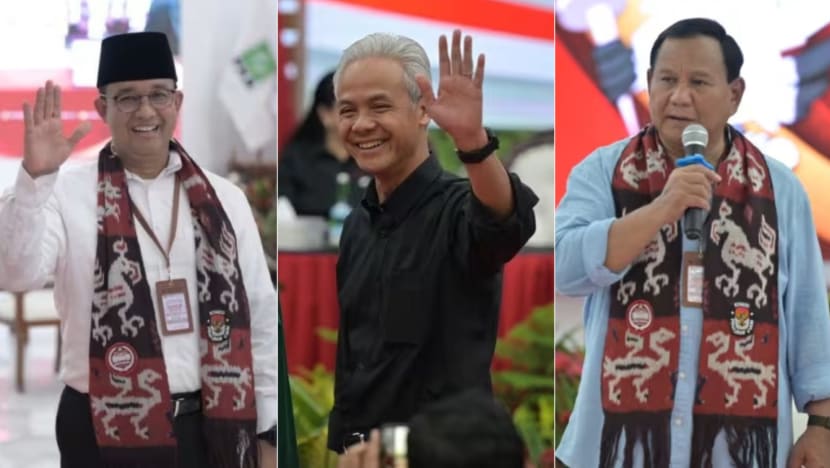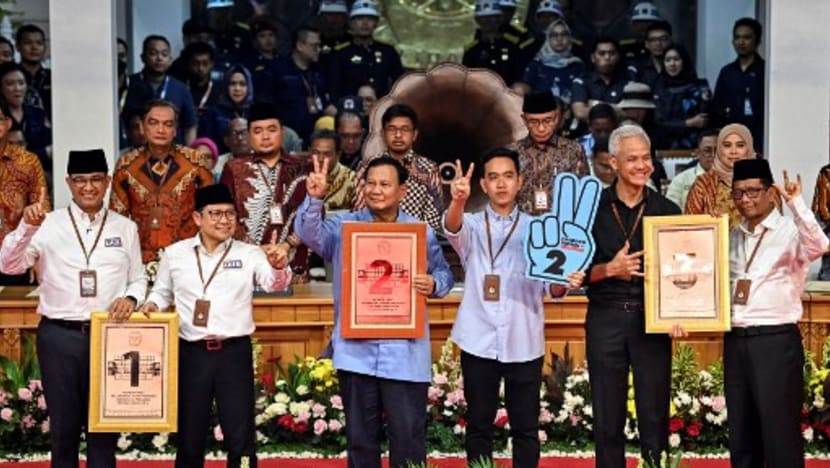Commentary: Can Indonesia’s three presidential candidates deliver on their promises?
Whoever wins Indonesia’s 2024 presidential election must have the technocratic capacity to develop the country’s human capital, says this ISEAS-Yusof Ishak Institute researcher.

Indonesia's presidential candidates: former Jakarta governor Anies Baswedan (left), former Central Java governor Ganjar Pranowo and Defence Minister Prabowo Subianto. (Photo: CNA/Wisnu Agung Prasetyo, Danang Wisanggeni)

This audio is generated by an AI tool.
SINGAPORE: Now that the candidates for Indonesia’s 2024 presidential election have been formally registered, the official campaign will start on Nov 28. Each pair has outlined their electoral promises in “vision and mission” documents submitted to the National Election Commission. Are these promises for the 2024 election achievable?
There are some key similarities. All propose eight “missions”, with the duo of Prabowo Subianto and Gibran Rakabuming Raka explicitly naming theirs Asta Cita (“eight ideals”), alluding to the fact that Indonesia will elect its eighth president.
These missions can be categorised into four major areas: Human capital including social protection, economic advancement including infrastructure, environmental protection, and law and governance.
Anies Baswedan and Muhaimin Iskandar’s (AMIN) vision is a “just and prosperous Indonesia for all”, while Ganjar Pranowo and Mahfud MD envisage an “excellent Indonesia … to realise a just and sustainable maritime nation”. Team Prabowo-Gibran believes that Indonesians should come “together in an advanced Indonesia, to achieve a Golden Indonesia 2045”.

ALIGNED WITH THE VISION FOR INDONESIA 2045
The various vision and mission documents referred to Indonesia’s draft long term development plan for 2025 to 2045, which has not been officially ratified as law. From a technocratic perspective, this is good news as the candidates’ proposed programmes are aligned with the grand vision for “Indonesia 2045”, where Indonesia aspires to be the fourth or fifth largest economy in the world on reaching 100 years of independence.
On macro-economic targets, Team AMIN seems to be the most realistic. The duo's targets are very close to the existing draft for Indonesia’s mid-term development planning for 2025 to 2029.
The pair did not hesitate to include numbers and details in their plan but while this gives a strong technocratic flavour, their less ambitious targets have led some to privately comment that a Baswedan administration might be too cautious or would be unable to aim for higher goals.
Meanwhile, Team Ganjar-Mahfud has set targets and indicators for cross-sectoral development that are generally higher than the national targets for 2025 to 2029. This sends a signal of optimism, which is reflected in the overall policy plan.
Team Prabowo-Gibran does not seem to offer any breakthrough except that the two have scaled up or even rebranded what President Joko Widodo’s administration has done, as many have commented. For example, they supposedly introduced a child health card and an elderly health card scheme, which are no different from the existing Indonesia Health Card, Indonesia’s national health insurance scheme.
Programme targets of the three teams for 2024 presidential election
| 2029 Targets | Anies-Muhaimin | Ganjar-Mahfud | Prabowo-Gibran | Existing figure |
|---|---|---|---|---|
| Economic growth | 5.5-6.5% | 7% | 6-7% | 5.31% (2022) |
| Poverty rate | 4-5% | 2.5% | < 6% | 9.57% (2022) |
| Unemployment rate | 3.5-4% | Reduce unemployment to level of workforce absorption, create 17 million jobs |
Create jobs (number unspecified) |
5.32% (2023) |
| Gini coefficient (0 = perfect equality) |
0.36-0.37 | 0.357-0.365 | Reduce inequality | 0.388 (2023) |
| Human development index (100 = highest development) |
74-75 | Not specified | > 80 | 74.39 (2023) |
PRIORITISING HUMAN CAPITAL DEVELOPMENT
The proposals mainly address one key challenge: That Indonesia’s demographic bonus will soon end, which justifies the prioritising of the development of human capital.
Human capital development is seen as the key to escape from Indonesia’s middle-income trap. There are at least five critical development issues facing Indonesia: Health, education, social protection, research and innovation, and job creation.
On health, Team AMIN’s plans include creating non-discriminatory, reliable and efficient health services; universal health coverage; and mental health services. Team Ganjar-Mahfud summarises its plan as “One village, one primary health service, one doctor”.
Team Prabowo-Gibran has seven proposals, mostly continuing Jokowi’s initiatives with one addition: Health insurance for the elderly and a populist “free milk and free lunch for pupils” flagship programme.
For childhood stunting, Team AMIN aspires to reduce its prevalence to 11 to 12.5 per cent, which is quite realistic. Team Ganjar-Mahfud ambitiously hopes for below nine per cent, while Team Prabowo-Gibran targets 80 million beneficiaries for their stunting prevention programme. Currently, the prevalence of stunting in Indonesia is 21.6 per cent, with 14 per cent as the target for 2024.
On education, Mr Baswedan's background as an academic and a former minister of education likely explains his team’s 37 detailed priorities. These far outnumber Team Ganjar-Mahfud’s five and Team Prabowo-Gibran’s six points but in terms of substance, they do not differ much.
The proposals focus on free education services including the expansion of scholarships and education funds, improving teacher quality and welfare, and revisiting the national curriculum.
On social protection, all, especially Team Prabowo-Gibran, seem eager to continue but to expand and improve on what Mr Widodo has started. Team Prabowo-Gibran believes it can push the poverty rate to below six per cent and extreme poverty to zero in the first two years if elected, which Jokowi has not achieved.
Team AMIN aims to cut poverty to 4 to 5 per cent, while Team Ganjar-Mahfud targets an ambitious 2.5 per cent through increasing recipients for cash transfers to 15 million families. However, these bolder targets will remain empty promises without the improved delivery of services.
On research and innovation, Team Prabowo-Gibran aims for the highest research and development (R&D) spending at 1.5 to 2 per cent of GDP by 2029 against Ganjar-Mahfud’s 1 per cent and AMIN’s 0.4 to 0.6 per cent.
Assuming Indonesia’s GDP could reach US$3.32 trillion by 2029, all three pairs’ R&D targets lie within a range of US$13.3 billion to $66.5 billion (between five to 23 times the 2021 figure). Team Prabowo-Gibran provides no details while the other two pairs will rely on incentivising the private sector.
Finally, all three teams promise to provide more jobs. Team Prabowo-Gibran again lacks clear explanations of how they will achieve this, while Team Ganjar-Mahfud aims to launch 17 million new jobs, including through MSMEs and start-ups. Team AMIN targets 15 million jobs, to reduce unemployment to 3.5 to 4 per cent.
CONTINUING AND IMPROVING JOKOWI’S POLICIES
The candidates likely want to convince the voters - most of whom approve of Jokowi’s performance - that they would continue and improve on what Jokowi has done. This is so even for Team AMIN, which is campaigning on “change”. At least for the human capital development programmes, what they offer is not markedly different from Jokowi’s existing policies.
More generally, Team Prabowo-Gibran seems to be using a more populist approach while Team AMIN appears the most realistic. Team Ganjar-Mahfud seems to be quite bold and ambitious.
For Indonesia’s middle to lower classes, Team Prabowo-Gibran’s programmes may appear as the most attractive but are technocratically challenging to execute. The middle class will likely find Team AMIN and Team Ganjar-Mahfud’s programmes equally strong.
What is positive is that all the 2024 candidates realise that Indonesia’s progress necessitates stronger human capital development. Clearly, improving human capital development is political in that it is a key vote-getter.
To attain significantly higher human capital development, however, involves complex technicalities. Whoever wins Indonesia’s 2024 election must have the technocratic capacity to deliver this.
Yanuar Nugroho is Visiting Senior Fellow at the ISEAS-Yusof Ishak Institute. This commentary first appeared on the Institute’s blog, Fulcrum.
















